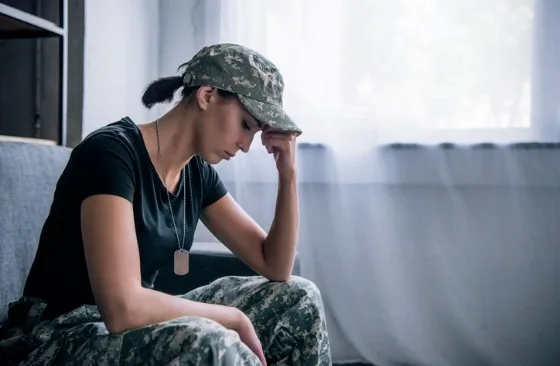Sgt. Erica Earl was in recovery from an eating disorder when she rattled off the Army Creed twice a day during bootcamp in 2014, but when it got to the “I am disciplined, physically and mentally tough” portion, she said she felt like a “fraud.”
“Even though I still had mental health issues, even back then, I believed that I could push through anything if I just tried hard enough,” she said. “There was some feeling like [I was a] fraud if I’m saying this [and] it’s not really matching how I feel.”
She’s not alone. Female service members are more likely to suffer mental health conditions than their male peers. About 12.8% of female troops are diagnosed with behavioral health conditions — almost double the rate of 7.5% for their male counterparts.
Recent reports have suggested that the disparity in mental health rates could be caused by several gender-specific stressors that female troops face — such as higher rates of sexual assault and harassment, body image issues, motherhood, workplace sexism and being left out by teammates.
The trend is further seen in deployed military personnel, where women are 3.1 to 3.5 times more likely to kill themselves than their non-deployed peers, according to a 2016 National Institute of Health study. Comparatively, the suicide rates for deployed men are about .9 to 1.2 times higher than their male peers.
Deployed women are also more likely to experience sexual assault and harassment, according to the Pentagon report.
While deployments heighten the risk of mental health issues for all troops, Virginia psychologist Tiffany Lange, Psy.D said women face additional gender-specific stressors because they tend to be responsible for child care.
“For women in particular, there’s the added stressors of child care concerns, financial readiness and emotional pain due to separation from children — in addition to potential combat exposure or being in pretty stressful locations across the globe,” she said. “Society, as a whole, puts more emphasis and pressure on women as a primary caregiver.”
The fact that women are much more likely to suffer sexual assault or harassment in the military also contributes to the disparity of mental health condition rates in the services, according to a 2022 RAND Corp. report on gender differences in troops’ health.
“We found that gender differences in self-reported overall health and symptoms of PTSD and depression are associated with exposure to sexual assault, sexual harassment and gender discrimination,” the report said.
About 8.4% of female troops reported experiencing unwanted sexual contact in 2021, according to the Pentagon’s latest report on sexual assault in the military, as opposed to 1.5% of male troops.
The male-dominated nature of the service worsens other factors, Lange said. Approximately one of every six active-duty service members are female, according to a 2022 report by the Defense Department’s Office for Diversity, Equity and Inclusion.
Some female military personnel report feeling less respected by their chain of command because of their gender.
“I think [stress] would be a reasonable reaction for anyone who was in an environment where they felt like they couldn’t advance based on their own merit,” Lange said.
Still, the stigma of seeking mental health care in the military and fears of negative consequences prevent some troops from reaching out for help, Lange said. To help reduce the stigma, Lange suggested that those who have good experiences seeking mental health care share their stories, and embrace the notion that doing so is brave.
“There’s not as much dialogue about positive experiences with mental health, and that has to do with how that stigma gets internalized and the view that it’s a weakness to seek services and a sign of strength to handle their problems on their own,” Lange said.
The myth that seeking mental health care will always result in medical discharge is widespread and damaging.
“Over 90% of military personnel who proactively seek mental health treatment do not experience a negative career impact,” Lange said. “Those who proactively seek mental health services are more likely to receive an adjustment disorder diagnosis [a temporary stress-related condition in response to a stressful event], rather than the more long-term or severe diagnoses of depression, anxiety or PTSD [post-traumatic stress disorder].”
Another reason some troops may be hesitant to seek help is the fear that their security clearance may be affected by doing so, Lange said. In security clearance applications, applicants must answer whether they have received mental health treatment in the past seven years — but a clearance cannot be denied based on an affirmative answer to that question alone, according to the Pentagon.
Even still, troops do not have to self-report receiving mental health counseling on security clearance applications if the care was related to marital, family adjustment or grief issues; adjustment related to returning home from combat service; or if the counseling was sought-out to deal with trauma from a sexual assault, according to the Defense Department.
There is no limit to the mental health care assistance troops and veterans can receive. The military’s healthcare system provides counseling and psychiatric resources when needed, which is also extended to those who have left the service under the Department of Veterans Affairs, according to the Pentagon.
The Defense Department also provides crisis hotlines and an assortment of mental health resources through its “Military One Source” program. The website is a one-stop shop for navigating military-provided mental health resources.
Eight years after bootcamp, Earl has taken advantage of several of the military’s many mental health care offerings, including private counseling, group therapy and in-patient treatment. She said she now knows that mental health isn’t something troops have to “push through” alone.
“My career always came above my own mental health,” she said. “People [should seek] help because mental health does come first, and you can’t really function when you’re so deep into a disorder — it’s so very dangerous.”
Resources
DoD Mental Health Resources for Service Members and Their Families















